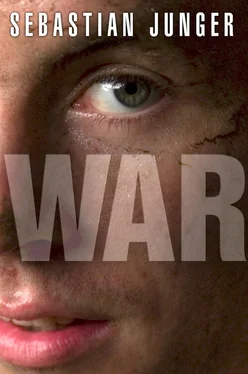Sebastian Junger - War
Здесь есть возможность читать онлайн «Sebastian Junger - War» — ознакомительный отрывок электронной книги совершенно бесплатно, а после прочтения отрывка купить полную версию. В некоторых случаях можно слушать аудио, скачать через торрент в формате fb2 и присутствует краткое содержание. Город: New York, Год выпуска: 2010, ISBN: 2010, Издательство: Twelve, Жанр: Публицистика, nonf_military, на английском языке. Описание произведения, (предисловие) а так же отзывы посетителей доступны на портале библиотеки ЛибКат.
- Название:War
- Автор:
- Издательство:Twelve
- Жанр:
- Год:2010
- Город:New York
- ISBN:978-0-446-56976-7
- Рейтинг книги:5 / 5. Голосов: 1
-
Избранное:Добавить в избранное
- Отзывы:
-
Ваша оценка:
- 100
- 1
- 2
- 3
- 4
- 5
War: краткое содержание, описание и аннотация
Предлагаем к чтению аннотацию, описание, краткое содержание или предисловие (зависит от того, что написал сам автор книги «War»). Если вы не нашли необходимую информацию о книге — напишите в комментариях, мы постараемся отыскать её.
, Sebastian Junger (
) turns his brilliant and empathetic eye to the reality of combat—the fear, the honor, and the trust among men in an extreme situation whose survival depends on their absolute commitment to one another. His on-the-ground account follows a single platoon through a 15-month tour of duty in the most dangerous outpost in Afghanistan’s Korengal Valley. Through the experiences of these young men at war, he shows what it means to fight, to serve, and to face down mortal danger on a daily basis.
War — читать онлайн ознакомительный отрывок
Ниже представлен текст книги, разбитый по страницам. Система сохранения места последней прочитанной страницы, позволяет с удобством читать онлайн бесплатно книгу «War», без необходимости каждый раз заново искать на чём Вы остановились. Поставьте закладку, и сможете в любой момент перейти на страницу, на которой закончили чтение.
Интервал:
Закладка:
There’s a lot of shooting out there and I’m not looking forward to running through it, but the cabin is filling with toxic gray smoke and I know we’re going to have to bail out eventually. I keep waiting for something like fear to take hold of me but it never does, I have a kind of flatlined functionality that barely raises my heart rate. I could do math problems in my head. It occurs to me that maybe I’ve been injured — often you don’t know right away — and I pat my way down both legs until I reach my feet, but everything is there. I get my gear in order and find the door lever with my hand and wait. There is a small black skeleton hanging from the rearview mirror and I notice that it’s still rocking from the force of the blast. I just sit there watching it. Finally Thyng gives the order and we all throw ourselves into the fresh cool morning air and start to run.
War is a lot of things and it’s useless to pretend that exciting isn’t one of them. It’s insanely exciting. The machinery of war and the sound it makes and the urgency of its use and the consequences of almost everything about it are the most exciting things anyone engaged in war will ever know. Soldiers discuss that fact with each other and eventually with their chaplains and their shrinks and maybe even their spouses, but the public will never hear about it. It’s just not something that many people want acknowledged. War is supposed to feel bad because undeniably bad things happen in it, but for a nineteen-year-old at the working end of a .50 cal during a firefight that everyone comes out of okay, war is life multiplied by some number that no one has ever heard of. In some ways twenty minutes of combat is more life than you could scrape together in a lifetime of doing something else. Combat isn’t where you might die — though that does happen — it’s where you find out whether you get to keep on living. Don’t underestimate the power of that revelation. Don’t underestimate the things young men will wager in order to play that game one more time.
The core psychological experiences of war are so primal and unadulterated, however, that they eclipse subtler feelings, like sorrow or remorse, that can gut you quietly for years. Once in Paris I caught sight of two men carrying a mattress across the street and went straight into full-blown panic: eyes wide, heart pounding, hands gripping my chair. I’d just come out of Liberia, where I’d seen a lot of dead and wounded people carried that way, and at the time I’d had no reaction at all, zero. I was too terrified by the violence around me, and too amped by the magnitude of the story I was covering, to pay much attention to anything else. Then a sagging mattress in Paris triggered a three-week backlog of trauma and shame.
We drive into the KOP late that afternoon, our destroyed Humvee chained to the one ahead of us and getting dragged through the mud like some kind of stubborn farm animal. The place has changed since I was last here, the men are cleaner and less wild-eyed and don’t have to wear body armor all the time. It’s strange to see them walking around as if this were just any old place in the world and the hills weren’t crawling with enemy fighters who wanted them all to die. There’s a new brick-and-mortar for the command center and there are shower curtains on the shitter doors and there are seven or eight new laptops with a high-speed satellite Internet connection. I’m told to sleep in one of the new buildings, so I carry my gear up and drop it on an empty cot. There’s only one other man in the room, a Third Platoon soldier named Loza who’s been in Italy for three months recovering from a shoulder wound. He sits quietly on a cot listening to music on his laptop and rigging out his gear. He ties his night vision scope to his helmet with green “550 cord” and attaches a nylon sling to his rifle and tries on his new boots and then puts them, heels together, against the cement wall.
Loza was shot up at Restrepo on the second day and his return to the KOP was mildly controversial because he still can’t lift his arm higher than his shoulder. He wanted to come back to be with his friends and someone behind a desk basically did him a favor. He pulls an X-ray out of his pack and shows it to me and at first I don’t even understand what I’m looking at. It looks like a black-and-white photo of a suspension bridge in the fog, until I realize that the spans and cables are actually pieces of metal screwed into his bone. I ask him if it hurt to get shot.
“No,” he said. “I just thought I’d been slapped.”
I’ve been on some kind of high-amplitude ride all day since the bomb went off, peaks where I can’t sit still and valleys that make me want to catch the next resupply out of here. Not because I’m scared but because I’m used to war being exciting and suddenly it’s not. Suddenly it seems weak and sad, a collective moral failure that has tricked me — tricked us all — into falling for the sheer drama of it. Young men in their terrible new roles with their terrible new machinery arrayed against equally strong young men on the other side of the valley, all dedicated to a kind of canceling out of each other until replacements arrive. Then it starts all over again. There’s so much human energy involved — so much courage, so much honor, so much blood — you could easily go a year here without questioning whether any of this needs to be happening in the first place. Nothing could convince this many people to work this hard at something that wasn’t necessary — right? — you’d catch yourself thinking.
That night I rewind the videotape of the explosion and try to watch it. My pulse gets so weird in the moments before we get hit that I almost have to look away. I can’t stop thinking about the ten feet or so that put that bomb beneath the engine block rather than beneath us. That night I have a dream. I’m watching a titanic battle between my older brother and the monsters of the underworld, and my brother is killing one after another with a huge shotgun. The monsters are cartoonlike and murderous and it doesn’t matter how many he kills because there’s an endless supply of them.
Eventually he’ll just run out of ammo, I realize. Eventually the monsters will win.
6
I DON’T LEAVE THE VALLEY, I STAY, AND AFTER A FEW days the war becomes normal again. We go on patrol and I focus on the fact that one foot goes in front of the other. We get ambushed and the only thing I’m interested in is what kind of cover we’ve got. It’s all very simple and straightforward, and it’s around this time that killing begins to make a kind of sense to me. It’s tempting to view killing as a political act because that’s where the repercussions play out, but that misses the point: a man behind a rock touched two wires to a battery and tried to kill me — to kill us. There are other ways to understand what he did, but none of them overrides the raw fact that this man wanted to negate everything I’d ever done in my life or might ever do. It felt malicious and personal in a way that combat didn’t. Combat theoretically gives you the chance to react well and survive; bombs don’t allow for anything. The pressure cooker was probably bought in Kandigal, the market town we passed through half an hour earlier. The bomber built a campfire in the draw to keep himself warm that night while waiting for us. We could see his footprints in the sand. The relationship between him and me couldn’t be clearer, and if I’d somehow had a chance to kill him before he touched the wires together I’m sure I would have. As a civilian, that’s not a pretty thought to have in your head. That’s not a thought that just sits there quietly and reassures you about things.
It was the ten feet that got me; I kept thinking about Murphree and then looking down at my legs. The idea that so much could be determined by so little was sort of intolerable. It made all of life look terrifying; it made the walk to the chow hall potentially as bad as a night patrol to Karingal. (The American contract worker who got shot at the KOP took a bullet to the leg instead of the head only because he happened to change directions on his cot that day.) The only way to calm your nerves in that environment was to marvel at the insane amount of firepower available to the Americans and hope that that changed the equation somehow. They have a huge shoulder-fired rocket called a Javelin, for example, that can be steered into the window of a speeding car half a mile away. Each Javelin round costs $80,000, and the idea that it’s fired by a guy who doesn’t make that in a year at a guy who doesn’t make that in a lifetime is somehow so outrageous it almost makes the war seem winnable. And the roar of a full-on firefight could be so reassuring that you wanted to run around hugging people afterward. That roar was what was keeping you alive, and it created an appreciation for firepower so profound that it bordered on the perverse.
Читать дальшеИнтервал:
Закладка:
Похожие книги на «War»
Представляем Вашему вниманию похожие книги на «War» списком для выбора. Мы отобрали схожую по названию и смыслу литературу в надежде предоставить читателям больше вариантов отыскать новые, интересные, ещё непрочитанные произведения.
Обсуждение, отзывы о книге «War» и просто собственные мнения читателей. Оставьте ваши комментарии, напишите, что Вы думаете о произведении, его смысле или главных героях. Укажите что конкретно понравилось, а что нет, и почему Вы так считаете.












